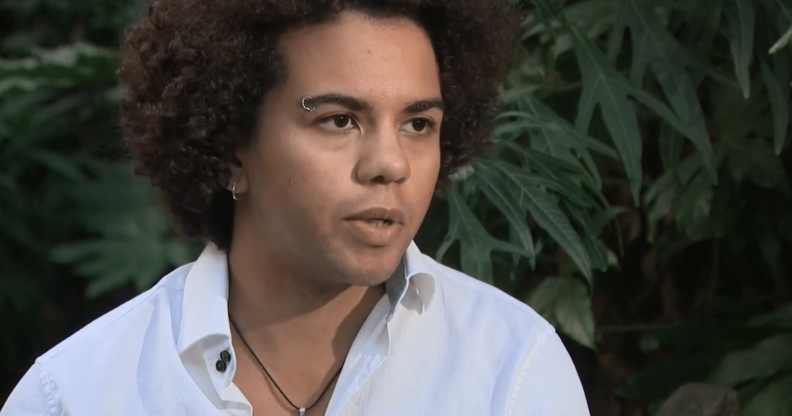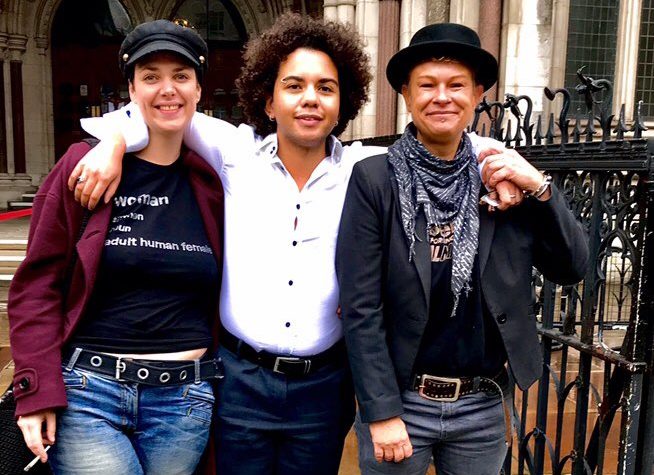Trans kids must understand risks of hormone therapy to receive life-saving puberty blockers, judge rules in landmark case

Keira Bell brought legal action against the Tavistock and Portman NHS Trust. (YouTube/Sky News)
Transgender under-16s must understand the implications both of puberty blockers and of potentially moving on to hormone therapy in order to consent to the medication, the High Court has ruled.
However, the judges said in their ruling that it is “doubtful” children aged 14 to 15 could understand “the long-term risks and consequences” of taking puberty blockers and then hormone replacement therapy (HRT), and “highly unlikely” that children under 13 would be competent to give consent.
As a result, the court said clinicians may “regard these as cases where the authorisation of the court should be sought prior to commencing the clinical treatment”.
Dame Victoria Sharp, president of the Queen’s Bench Division of the High Court, said that trans under-16’s must be able to give “valid consent” to puberty blockers, including understanding the long-term effects of puberty blockers as well as that those who take them are likely to continue their transition in the future and move on to HRT.
“The vast majority of patients taking puberty blocking drugs proceed to taking cross-sex hormones,” meaning they are a “pathway to much greater medical intervention”, Sharp noted.
She added that children would need to understand the impact of the “treatment pathway” on “future and life-long relationships”, and be aware of the “unknown physical consequences of taking puberty blocking drugs and the fact that the evidence base for this treatment is as yet highly uncertain”.
The ruling in the case, brought forward by Keira Bell and the mother of a trans teen trying to block their treatment, added: “There will be enormous difficulties in a child under 16 understanding and weighing up this information and deciding whether to consent to the use of puberty blocking medication.
“It is highly unlikely that a child aged 13 or under would be competent to give consent to the administration of puberty blockers.
“It is doubtful that a child aged 14 or 15 could understand and weigh the long-term risks and consequences of the administration of puberty blockers.”
“In respect of young persons aged 16 and over, the legal position is that there is a presumption that they have the ability to consent to medical treatment.
“Given the long-term consequences of the clinical interventions at issue in this case, and given that the treatment is as yet innovative and experimental, we recognise that clinicians may well regard these as cases where the authorisation of the court should be sought prior to commencing the clinical treatment.”
This judgement is anticipated to have global ramifications, including in the US where trans teenagers’ access to healthcare is under threat in several states from Republican-backed bills.
A spokesperson for the Tavistock and Portman NHS Foundation Trust said: “The trust is disappointed by today’s judgment and we understand that the outcome is likely to cause anxiety for patients and their families.
“Our first duty is to our patients, particularly those currently receiving hormone blocking treatment, and we are working with our partners, University College London Hospitals NHS Foundation Trust and Leeds Teaching Hospitals NHS Trust, to provide support for patients concerned about the impact on their care.
“The trust is seeking permission to appeal the judgment, and in the meantime, confirms its ongoing support for the review commissioned by NHS England being led by Dr Hilary Cass.”
Mermaids said the ruling deals a “potentially devastating blow to trans under-16s”, and called it a “betrayal of trans young people”.
BREAKING: High Court ruling deals a potentially devastating blow to trans under 16s seeking access to life-saving puberty blockers. We will respond in full and expect an appeal from GIDS. This is a betrayal of trans young people. The summary judgment in full: pic.twitter.com/0XMjc9M84k— Mermaids (@Mermaids_Gender) December 1, 2020
Puberty blockers case brought by Keira Bell and mother trying to block trans kid’s treatment.
The landmark judicial review into transgender under-18’s access to puberty blocking medication was held at London’s High Court on 7 and 8 October.
The case hinged on whether under-18’s can give informed consent to the treatment.
The judicial review was brought against The Tavistock and Portman NHS Trust, which houses the Gender Identity Development Services (GIDS) clinic, and which supports young people, and their families, who are experiencing difficulties around their gender identity.
It was brought by Keira Bell, 23, who took puberty blockers at 16 and had top surgery at 20 but has since detransitioned, and Mrs A, who is trying to prevent her 16-year-old child taking puberty blockers.

Keira Bell, centre, and supporters outside the Royal Courts of Justice during the hearing in October. (Twitter/Belstaffie)
Puberty blockers are widely deemed safe, reversible and medically necessary, lawyers for the Tavistock maintained. Lawyers for Bell and Mrs A argued that trans teens should have to go before a court before being able to access the medication.
On the first day of the hearing, Jeremy Hyam QC, barrister for Bell and Mrs A, told the High Court that their case was that trans youth who are prescribed puberty blockers by the Tavistock gender clinic “are giving informed consent to a basket of risks they can’t compute”.
He said that trans youth should be made to obtain a judge’s approval before being able to be prescribed the medication.
Claiming that they are not trying to prevent the medication being prescribed to trans youth, Hyam said that it would “protect the autonomy of these young children” for “the court to be the arbiter of whether appropriate care is given”.
“It should not be left to the doctors,” he said.
On the second day, the court heard about the benefits of puberty blockers to trans youth “distressed” by gender dysphoria.
John McKendrick QC, barrister for University College London Hospitals (UCLH) NHS Trust, which prescribes the medication to trans teens referred by the Tavistock’s gender clinic for young trans people, told the High Court today that puberty blockers are a successful treatment.
“The whole purpose of NHS England commissioning this service is to reduce the suicidal ideation and distress caused by gender dysphoria in young people,” McKendrick said. “And that has been achieved. We are treating distressed and vulnerable young people.”
The case was heard by the president of the Queens Bench Division, Dame Victoria Sharp, and Lord Justice Lewis and Mrs Justice Lieven.

